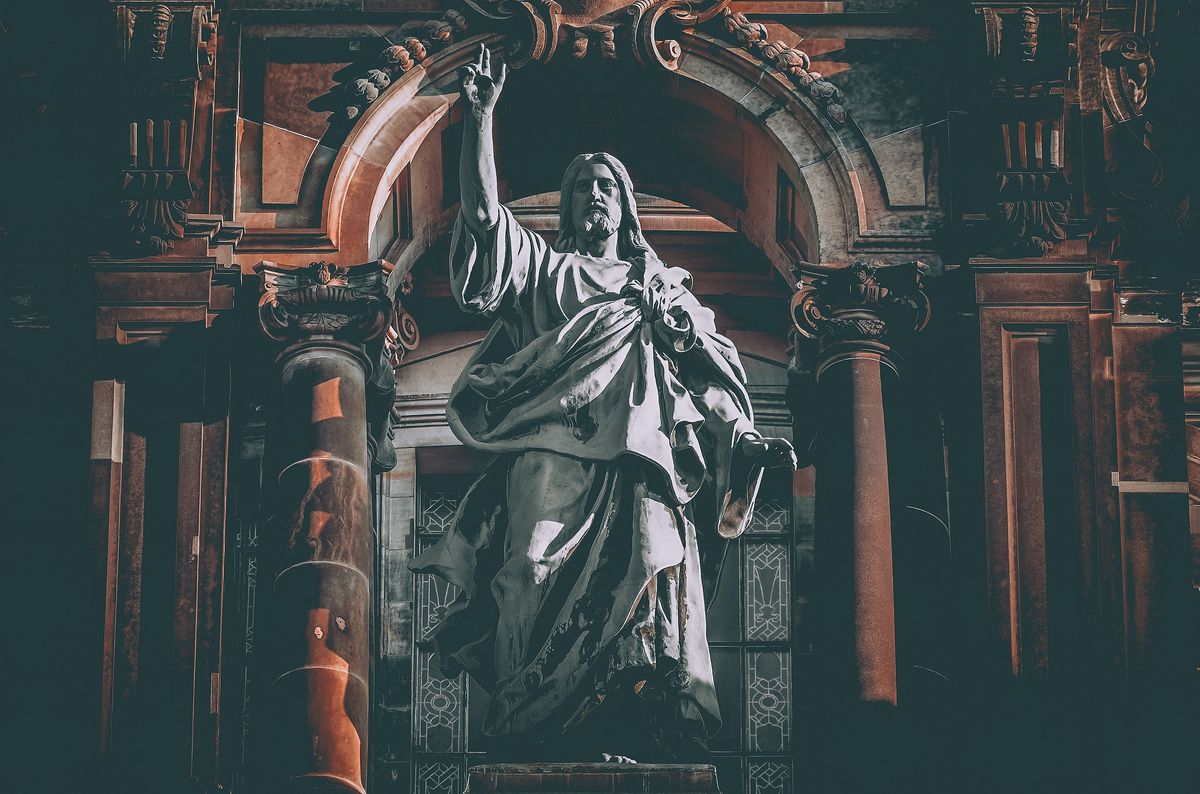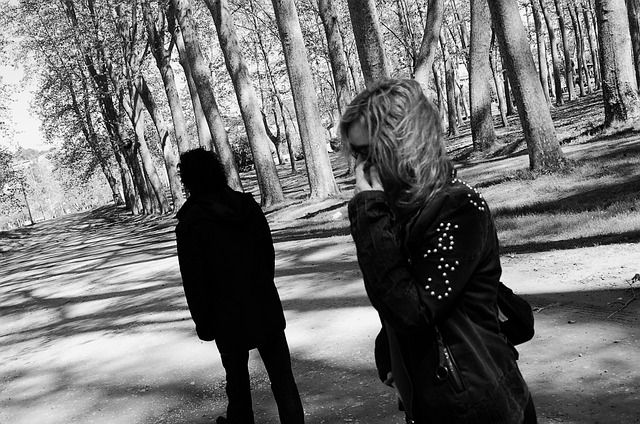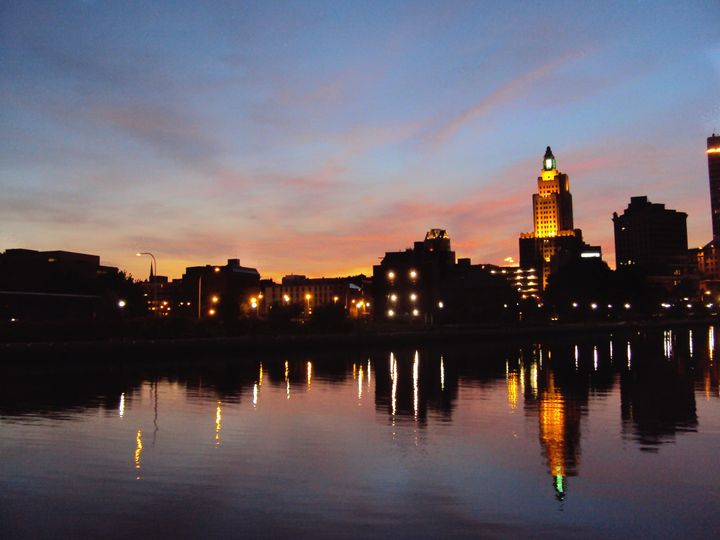Losing My Religion

God is dead.
I was in denial of this very obvious fact, like a man holding a still-smoking gun who can’t believe he had the tenacity to pull the trigger. There was no such immediate moment, however, when this realization came to me. One day he was there, and on another he wasn’t, and I can’t draw a distinctive line between the two days.
I guess it all started with doubt in a coffee shop in New Jersey.
Indian Bill and I would drink coffee and smoke cigarettes together back in ’92. Bill was an old man with long white hair, a cane, and quite a bit of Native American blood in him, and he always sat by the window, leaning his chair back against the wall. I was fourteen, and thought I was really smart. By most accounts, I was certainly more intelligent than most of my peers, though probably less so than I fancied myself. Youthful hubris, I suppose, but I enjoyed the company of adults because they were so much more educational and talked more about things I found interesting.
One of the things we discussed was God and spirituality. Bill was more of a humanist than a spiritualist, believing that we ought to take care of each other as fellow man because it was the right thing to do, not because of a God who commanded it. I tended to agree with him.
Our friend Jimmy, probably somewhere between my age and Indian Bill’s, was a born-again Christian. Not too preachy, Jimmy was nonetheless always communicating to us the effect God had in his life. I appreciated his faith. It always seemed so sincere and like it had a positive impact in his life, but it still wasn’t an attractive worldview to me. Besides, it didn’t fit with the way I wanted to live my life. I mean, after all, I was a teenage boy who had girlfriends, and I was pretty sure it wasn’t part of being a Christian to keep on lusting after them the way I was.
Just a couple of years later, I found myself going to a Catholic youth group on Friday nights. I was talked into going by a slightly older girl I was seeing, and judging by the way we fooled around, I should have known this wasn’t an invitation to save my soul.
Indeed, even though there was all kinds of song-singing and intercessory prayers by candlelight, it was clear after a few weeks of this that it was just a way for boys and girls to hook up. One I dated for awhile, and we spent evenings in my bed. Another talked me into phone sex. Yet a third made a bet with her mother that I’d be a good lay, which she decided to find out in my backseat a year later.
So this was no holy group. I can’t say I didn’t find some religion there, to be honest, but it was a different kind of religion than you’d find in the bible verses we’d read and discuss for an hour. It was more of an ethical hedonism that appealed to me, yet a cautious and informed one. I preferred my company to be both sensual and intelligent, and we’d worship at the altar of the gods of Sybaritic passion for all things that we enjoyed: food, drink, sex, intellectual conversation. That was a “religious experience” for many of us who attended Antioch, so it isn’t a stretch to say that we achieved some spiritualism in our meeting; it just wasn’t of the Catholic variety.
Still, this was probably still my first real exposure to the bible and its story, despite the year I attended Catholic school in 5th grade. Religion classes at such a young age were about stories and catechism lessons more than learning any theology or reasons for belief. It was assumed that we were already adherents, although I wasn’t and my best friends Francis (who was Jewish) and Bryan (who didn’t really care) weren’t, either. The only class I liked was English, which incidentally wasn’t taught by a nun (and I’m fairly certain she wasn’t even Catholic).
Throughout my teenage years I casually glanced at the bible my dad kept in his room, presumably a gift, as it was very old, and I knew he wasn’t a believer. Thumbing through it quite a bit, and stopping on many pages, I couldn’t find anything in there of relevance. There wasn’t a jot or tittle I saw that spoke to me. Surely, if any of this were real, God would guide me to the right pages and a line would glow, an angelic choir praising Hallelujah in the background, my eyes finally opened like Saul of Tarsus on the road to Damascus.
Instead it just sat there, as lifeless as it always was.
Life started going downhill at a pretty good clip right around when I turned eighteen. My father decided not long after to kick me out of the house. I spent my days hanging around the campus at the local community college, wasting days in the library on the computers in the (very) early days of the world wide web, and sleeping in the cafeteria, where I could blend in by playing the part of a tired student who stayed up too late studying.
A lot of my friends went to school there, and in between classes took over a large corner of the cafeteria. They made sure I was fed and taken care of, physically and psychologically. Most of them weren’t really believers, either. Jai, however, was. I always wondered why he never took advantage of the enormous amount of attention he received from the bevy of girls who fawned over him. That’s when I found out he was a born-again Christian. A devout one, even. He didn’t drink, didn’t smoke, didn’t have sex.
“Do you have fun?” I asked him one day, ribbing him.
He smirked. “Yeah, at the bible study I go to on Friday nights. You should come.”
Considering all the girls he had following him, I thought maybe it couldn’t hurt. It wasn’t even a few weeks later that the Gideons were handing out little pocket-sized copies of the New Testament. I took one of the grass-green-covered books, stuck it in my pocket. Maybe I’d need bathroom reading one day. This was around 1995, before anyone beyond IT uber-professionals and rich geeks had “smartphones.” One always had to be prepared for an extended sitting session in the john, just as I found myself a few days later, while in the stall at the local diner.
Jesus was giving his sermon on the mount, in Matthew, right where I opened it to.
“Blessed are the poor in spirit,” he said, seeming to speak to me, “for theirs is the kingdom of heaven.”
Huh, I thought. Jesus seems pretty into the poor. I didn’t expect that. I kept on reading, discovering how God likes people who are merciful, and how Jesus blesses people who are persecuted in his name. That seemed odd and counterintuitive, but I’m always attracted to counterintuitive ideas, so I went with it.
Then came the Town on a Hill comparison, in which basically Jesus tells people to do good things so other people will believe in their God.
For my part, I was still pretty stuck on the poor in spirit stuff. I can’t explain why, but I suddenly found myself wanting to believe what I was reading. Inexplicably, I was being converted—or, as a reluctantly realized later, was converting myself—right in the little stall in a restroom of a diner in New Jersey.
To Lewis R. Rambo, author of Understanding Religious Conversion, it really wasn’t that inexplicable. Rambo’s integrative model of conversion is a seven stage process that converts go through on their way to believing in religion, and the factors are an accumulation of different experiences and influences from a wide variety of people and institutions. It is a psychological process, Rambo maintains, not a spiritual one.
Hindsight is 20/20. Looking back, I can’t even tell you all of the factors involved in the decision I made, if there was even a decision made at all; it was more of a process just happening. I don’t remember any “commitment” moment. I left the bathroom with my newfound want to believe, and returned to my friends in the diner, where we resumed our games and jokes and lives. It wasn’t until I saw Jai again at the cafeteria a few days later that I announced my new identification with Christianity, and the commitment itself was more on the spot than premeditated.
Nonetheless, committed I became. I started attending the bible study Jai went to on Friday nights, and I met a pretty extraordinary group of people. These weren’t Christians like I had thought of (or even met before), these were thoughtful and intelligent young men and women led by an academic named Jode. We studied the scriptures in a fascinatingly deep way, prayed in a direct, conversational manner, and sung songs with reverence and a heartfelt sincerity. I was hooked. I found myself developing a deep relationship with Jode, as he became my mentor.
As great as all that was, I couldn’t help but often think of myself as a fraud.
I, as I’m sure many Christians do, went back and forth between deep spirituality and flagrant sin, and though I can say that despite the way I appeared to others—changing as a flower blooms—my private life was not much different than it was before I turned to God. I took every opportunity I had to get laid, then hypocritically preached at the poor girls who were kindly enough to sleep with me. I had deep conflicts inside about whether I was even “saved” if I could stay so seemingly unchanged. Internally, I had doubts about everything—including whether anything in this bible was true.
I greatly enjoyed my conversations with Jode, who assured me that the changes evident in my life were proof that I was saved and a true adherent to Jesus Christ. I didn’t agree with him, most likely because I knew about the private transgressions that he didn’t. I mostly enjoyed the intellectual and academic side of the faith, not the really spiritual stuff. I liked being able to have very cerebral conversations about faith with pastors and authors and seeming insightful at bible study. I genuinely believed, but I didn’t see myself as a believer like the believers around me, whose lives seemed to better reflect their perhaps more genuine faith.
I became baptized at my church, during a ceremony for new believers. I felt like an intruder during the membership class, where we learned about the precepts of our particular church. In order to proceed, I had to agree with a number of very specific theological points, most of which I thought were inconsequential, even for true believers, but I did what I was expected of me. Everyone else’s testimony (church lingo for “conversion story”) seemed much more epic than mine. When I gave my testimony at the ceremony, I amped it up a little bit, talking about my homelessness (true) and having to eat meals from dumpsters (not true) before going to live with the family of a friend (true) who became like family to me (true), which must have been the doing of the Invisible Man in the Sky (not true). At best, it was a good and dramatic story, and I discovered that night that I liked public speaking, which should have been no surprise, given how much I enjoyed hearing myself speak. At worst, I belittled the contributions of the friends and their families who helped me through those difficult times in my life.
Living the faith was just hard, though, and it seemed to me that if all of this business were the real thing, it shouldn’t have been difficult. If God was truly inside me and changing my rotting sinful self to a shiny piece of gold, like all the marketing promised, then why was I largely the same person that I was before? Lazy, horny, often mean, and preachy without compassion?
Not to mention how it made me feel about myself. I became more self-righteous than ever, while simultaneously considering myself to be a loathsome, disgusting human—and ultimately that all humans were loathsome and disgusting. It’s hard to love other people properly when you think that all members of your species are vile because of sin. Every time I had a “base urge,” or dated a woman who wasn’t a Christian, or even thought about questioning the faith, the guilt would be overwhelming, and I became even more of a self-righteous asshat; it’s something like being more of a scumbag to make up for being a scumbag.
After awhile, I started to think about asking for my money back. It felt like the whole message was false advertising.
It was largely geographic separation from the church and the bible study that allowed me to reflect on the claims of the bible and the religion, and thus for the doubt to expand. At some point, we become middle-aged, and at some other point, we become old. We don’t know exactly when it happens, it just does. It’s in the same way I became an atheist.
I had always maintained that if any part of the infallible, inspired “word of God” had proved to be wrong, the whole thing falls apart. After all, how can something be infallible unless it’s actually divine, not just a creation of humans? And there was so, so much that didn’t make sense. The creation story. The conflicted accounts of the gospels. God as three, yet one being. It just didn’t jive with the reality. How could every scientist be wrong about the age of the earth? If the gospels were inspired by God and he made sure every word in the scriptures were true, why all the conflicts in the story of Christ’s own birth? If God wanted to forgive us, why was anyone’s death necessary?
That’s not forgiveness, that’s a transactional payment.
These doubts were thorns in my mind, every time I tried to return to the Good Book. I still professed at least a fundamental belief in the supernatural existence of God; indeed, I couldn’t even bring myself to use the ever-so-satisfying “Jesus Kee-RIIIST” swear when I was particularly aggravated, for fear of upsetting the Big Man Upstairs and damning myself to eternal torture. I still felt guilty about even thinking a woman was pretty. I would still express doubts about established science like evolution, saying stupid things that every Christian apologist says, like, “oh sure, microevolution probably happened, but macroevolution? Gimme a break! Ha ha, I ain’t never seen no cat give birth to a dog!”
Obviously, I was not well-educated about evolution.
Even when I knew that I no longer considered the bible an authoritative source on the reality of the world, the effects of only twelve years of being a born-again evangelical still had a hold on my mind and my intellect. I felt reluctant, for whatever reason, to just throw it all away. I couldn’t tell you why.
It wasn’t until about two years ago that I could say it: “I don’t believe in any god.” Finally I unshackled myself from a superstitious belief in a man upstairs, who created everything in the entire universe (yet came from nowhere), who created a cosmos so vast and so large, so beautiful and so complex, and yet he’s supposed to care if I even think about sex, or being mad at the guy who stole my wallet. I could finally be free from this belief in a book that was written by utterly uneducated people who had no explanations for why things were the way they were, so they believed what some people told them about it and, eventually, some other people wrote it all down. It’s a belief that, ultimately, I have a hard time putting stock in, because there’s, quite literally, no good, logical reason to believe it.
None, indeed. God was dead.
Difficult and hard reflection on my time as a supernaturalist brings me to some conclusions as to why I took such radical diversions in my belief system.
I found the bible to contain a rich set of philosophical rulesets, and dedicating a lot of time to making internal sense of them all—bringing everything into line with everything else—was cerebrally satisfying. It’s the same reason why comic book fans or dedicated Dungeons & Dragons players enjoy poring over and discussing minute details of fake universes. Coming up with interesting theories about a faux-reality, theories that have no impact on the real world, and having deep conversations about those concepts that last well into the night is both comforting and stimulating.
Equally important is the social context I was in. Rarely was there much in my life that was respected. That wasn’t true when I went to church or to bible study, or even when I would have conversations with younger, newer Christians, who considered me “wise.” That was an adjective no one really applied to me in any other area of my life. Like any person who needs validation for their existence, I reveled in the place I held among my peers. I went out of my way to provide this wisdom to as many people as I could, so as to bolster my place in the social sphere I lived in. (This, of course, served to worsen the feelings I had about my internal struggle and drove deeper the feeling that I might be a fraud.)
Another thing I can glean in hindsight is that whatever the processes that led me to becoming a “follower of Jesus,” it wasn’t religious experience. God did not appear to me, angels didn’t come down and fly me to heaven. I had some thoughts in my head and feelings in my gut and things transpired from there. When you compare such fleeting, human quirks to the alleged revelations to the prophets, the appearance of God to Moses, the bodily incarnation of a messiah who is also somehow God… why, those would be religious experiences, if they were true. But there’s no reason to believe they’re true. These kinds of things don’t happen today, but if you were to take the word of the authors of the bible, they were commonplace once upon a time. Yet I, along with millions of others, thought a brief passing uncontrollable thought counts among the great religious experiences in those ancient texts.
Why we would hold this belief so fervently is something I won’t ever understand, other than we really, really want them to be true. No matter how much I willed myself to accept it wholesale, the pull of reality was, in the end, just too strong. I now consider myself to be free. And when it comes to freedom, it comes, as they say, better late than never.




Comments ()